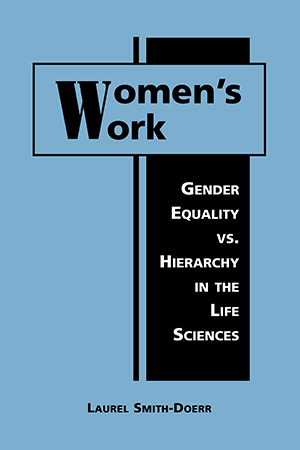
- 2004/205 pages
Women's Work:
Gender Equality vs. Hierarchy in the Life Sciences
Laurel Smith-Doerr reveals that, contrary to widely held assumptions, strong career opportunities for women and minorities do not depend on the formal policies and long job ladders that large, hierarchical bureaucracies provide. In fact, highly internally linked biotechnology firms are far better workplaces for female scientists (when compared to university settings or established pharmaceutical companies), offering women richer opportunities for career advancement.
Based on quantitative analyses of more than two-thousand life scientists' careers and qualitative studies of scientists in eight biotech and university settings, Smith-Doerr's work shows clearly that the network form of organization, rather than fostering "old boy networks," provides the organizational flexibility that not only stimulates innovation, but also aids women's success.







